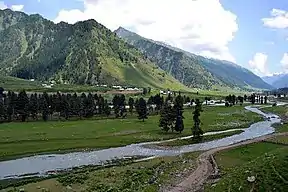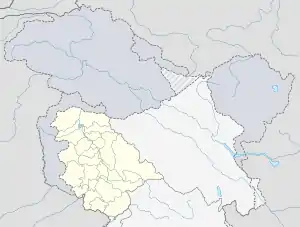Warwan Valley
The Warwan Valley is a Himalayan sub-valley and a tehsil in Kishtwar District in the union territory of Jammu and Kashmir in India. The Valley lies 68 kilometres (42 mi) northeast of Kishtwar and 150 kilometres (93 mi) from Srinagar the capital of Jammu and Kashmir.
| Warwan Valley | |
|---|---|
 Warwan Valley | |
 Warwan Valley Location in Jammu and Kashmir, India  Warwan Valley Warwan Valley (India) | |
| Floor elevation | 2,134 m (7,001 ft) |
| Geography | |
| Location | Kishtwar, Jammu and Kashmir, India |
| Country | India |
| State | Jammu and Kashmir |
| District | Kishtwar |
| Borders on | Zanskar (East) Kishtwar (West) Anantnag (North) Marwah (South)) |
| Coordinates | 33°51′51″N 75°32′07″E |
| River | Warwan River a tributary of Chenab River |
It falls the jurisdiction of Kishtwar district in Marwah Sub_Division of Jammu and Kashmir.[1]
Geology
The Warwan Valley is drained by the Warwan River. It is a river formed by the confluence of the Batkot and Gumbar streams. The river is called Marusudar in the lower reaches of the valley and is the biggest right tributary of the Chenab River which in turn is a tributary of the Indus River system.[2]
A geological mapping survey has revealed that the Warwan Valley has experienced three distinct phases of folding in polyphase deformation. The Palaeozoic-Mesozoic succession crops out in the southern part of the valley, while as the eastern limb is overturned. The survey mapped the following stratigraphic succession from oldest to youngest:[3]
Salkhala Group
- Ramsu-Machhal Formation
- Lolab Formation
- Karihul Formation
- Margan Formation
- Muth Quartzite
- Syringothyris Limestone
- Fenestella Shale
- Agglomeratic Slate
- Panjal Volcanics
- Zewan Formation
- Khunamuh Formation
- Khrew Formation
- Wuyan Formation
- Drumgam Formation
Geography
The Warwan is a himalayan valley situated at an altitude of 2,134 m (7,001 ft) above sea level. It is bordered by main Kashmir Valley in the north and Ladakh in the east. Its parent district Kishtwar lies in the south. A few villages are Sukhnai, Margi, Busmina, Aftee and Inshan.[4][5] Its main crops are wheat, paddy, trumba, potatoes etc. Its soil is not fertile as such it is sandy. Warwan valley receives a huge amount of snowfall in winters as it is at altitude of 2134 km above sea level.
Flora and fauna
About 75% of the valley remains under vegetation-cover and a total of 285 plant species, belonging to 191 genera in 60 families were recorded in a floristic survey, conducted in 2015. Among these plant species, 26 are categorised as threatened. The main flowering season in the valley is June to July. The valley is rich in medicinal plants, which are used to treat ailments of the local people.[6]
Accessibility
Warwan Valley is one of the most remote valleys of Jammu and Kashmir and it suffers from a lack of access to proper roads, communication facilities and electricity. The valley remains cut off for about six or seven months every year due to heavy snowfall. In 2016, Margi village of the valley got completely destroyed by fire.[7][8][9]
References
- "Warwan Valley". www.jktdc.co.in. Retrieved 12 February 2019.
- "Chenab -". india-wris.nrsc.gov.in. Retrieved 20 February 2019.
- "Geology of part of Warwan Valley, Doda district, Kashmir Himalaya". ResearchGate. Retrieved 20 February 2019.
- "Warwan Valley: A hidden beauty". GreaterKashmir.Com. Retrieved 20 February 2019.
- "District census handbook Kishtwar" (PDF). Census India. Retrieved 20 February 2019.
- Malik, Akhtar Hussain; Rashid, Irfan; Ganie, Ajaiz Hassan; Khuroo, Anzar Ahmad; Dar, Ghulam Hassan (1 July 2015). "Benefitting from geoinformatics: Estimating floristic diversity of Warwan Valley in Northwestern Himalaya, India". Journal of Mountain Science. 12 (4): 854–863. doi:10.1007/s11629-015-3457-2. ISSN 1993-0321.
- "Destroyed Madwah Village Residents Will Migrate For Winter". Kashmir Life. 16 October 2016. Retrieved 12 February 2019.
- "Warwan Valley: A hidden beauty". GreaterKashmir. Retrieved 13 February 2019.
- Ul-Islam, Zia (1 January 2017). "Marwah-Warwan residents await basic amenities". Kashmir Reader. Retrieved 19 February 2019.